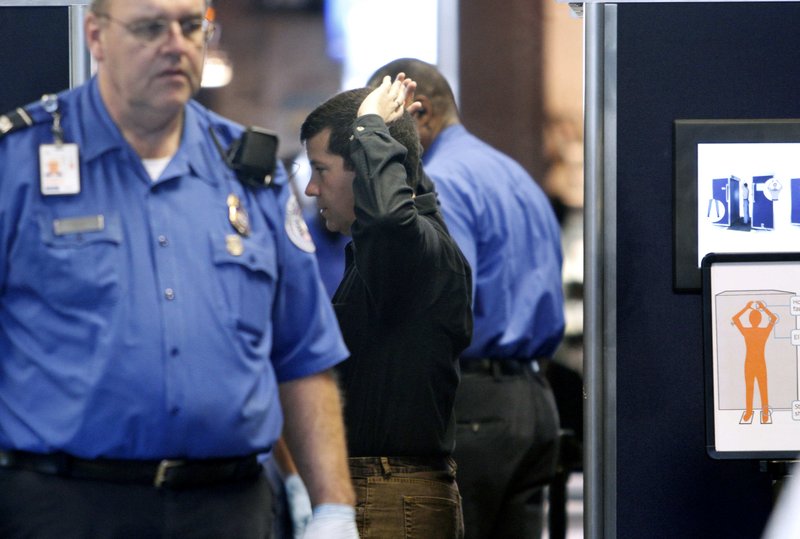CHICAGO — The lines of Thanksgiving travelers moved smoothly at airports around the country Wednesday morning despite an Internet campaign to get passengers to gum up the works on one of the busiest days of the year by refusing full-body scans.
The Transportation Security Administration said very few passengers opted out. And there were only scattered protesters — including, presumably, a man seen walking around the Salt Lake City airport in a skimpy, Speedo-style bathing suit, and a woman reported to be wearing a bikini in Los Angeles.
After days of tough talk on the Internet and warnings of possible delays, some passengers decided to go to the airport especially early and were pleasantly surprised.
Retirees Bill and Margaret Selfridge arrived three hours early at the Minneapolis-St. Paul airport for their flight to Washington. It took only 10 minutes to get through the checkpoint at 8 a.m.
“Now we get to drink a lot of coffee,” Bill Selfridge said.
Ruth Billingsly, 52, showed up three hours ahead of schedule at the Philadelphia airport for her trip to Los Angeles. “It was a breeze,” she said. “I’m really, really early. Maybe I should take a nap.”
A loosely organized effort dubbed National Opt-Out Day planned to use fliers, T-shirts and, in one case, a Scottish kilt to highlight what some call unnecessarily intrusive security screenings. The screenings have been lampooned on “Saturday Night Live” and mocked on T-shirts, bumper stickers and underwear emblazoned “Don’t Touch My Junk,” from a line uttered by a traveler in San Diego who objected to a pat-down.
But the weather was shaping up as a much bigger threat: A ferocious, early-season snowstorm was expected to delay air travelers and drivers in the West, and heavy rain was also forecast in the Midwest. Windy weather in New England could also create snags.
More than 40 million people plan to travel over the Thanksgiving holiday, according to AAA, with more than 1.6 million flying — a 3.5 percent increase from last year.
Wait times for security checks at major U.S. airports from San Francisco to New York were 20 minutes or less Wednesday morning, according to the TSA, and no serious disruptions were reported
Asked early Wednesday if the protests were having any noticeable effect, TSA chief John Pistole told The Associated Press, “Not that we’ve seen overall. I mean we’ve, you know, had a couple of one-offs here and there.”
“So far, so good,” he said. “No long wait times or anything.”
Earlier Wednesday, Pistole told ABC’s “Good Morning America” that his agency is fully staffed to deal with problems and that travelers should be prepared for delays because of the threatened protests. For days, he has pleaded with Thanksgiving travelers not to boycott the body scans and delay other people.
One Internet-based protest group called We Won’t Fly said hundreds of activists would go to 27 U.S. airports Wednesday to pass out fliers with messages such as “You have the right to say, ‘No radiation strip search! No groping of genitals!’ Say, ‘I opt out.”’
“If 99 percent of people normally agree to go through scanners, we hope that falls to 95 percent,” said one organizer, George Donnelly. “That would make it a success.”
If enough people opt for a pat-down rather than a body scan, security-line delays could quickly cascade. Full-body scans for passengers chosen at random take as little as 10 seconds. New pat-down procedures, in which a security agent touches a traveler’s crotch and chest, can take four minutes or longer.
TSA officials say the procedures are necessary to ward off terror attacks like the attempted bombing of a Detroit-bound plane last Christmas, allegedly by a Nigerian man who stashed explosives in his underwear.
